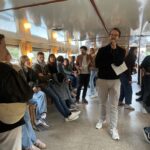Vom 12. bis 16. Juni 2025 fand in Denver, Colorado (USA) die 75. Jahrestagung der International Communication Association (ICA) unter dem Motto „Disrupting and Consolidating Communication Research“ statt. Auch in diesem Jahr war unser Institut stark vertreten – und durfte sich über mehrere bedeutende Auszeichnungen freuen!
Preise der ICA
Daniel Stegmann wurde in der Journalism Division mit dem Top Student Paper Award für seinen Beitrag "News that Unites? How News Consumption Patterns Foster Social Cohesion" ausgezeichnet.
Anisha Arenz (U. Amsterdam) und Anna Schnauber-Stockmann erhielten in der Mobile Communication Division den Top Student-Led Paper Award für ihren gemeinsam verfassten Beitrag "What Triggers Co-Present Smartphone Use in Everyday Life?".
Thomas Koch und Nora Denner wurden in der Environmental Communication Division mit einem Top Paper Award für ihren Beitrag "What is Greenwashing? A Scoping Review of Greenwashing Definitions and a Conceptual Model of Its Causes, Emergence and Consequences" geehrt.
Wir gratulieren unseren Kolleginnen und Kollegen ganz herzlich zu diesen herausragenden Erfolgen auf dieser bedeutenden internationalen Fachtagung!











![1. Preis für die beste Tagungseinreichun: Alina Jakob, Juliane Keilmann, Nayla Fawzi und Thomas Zerback -
70. DGPuK Jahrestagung 2025 in Berlin; [copyright: www.arne-sattler.de]](https://www.ifp.uni-mainz.de/files/2025/03/DGPuK_2025_-091-1-150x150.jpg)
![Besten kommunikationswissenschaftlichen Zeitschriftenaufsatz: Pascal Schneiders, Birgit Stark, Daniel Stegmann und Sebastian Buggert - 70. DGPuK Jahrestagung 2025 in Berlin; [copyright: www.arne-sattler.de]](https://www.ifp.uni-mainz.de/files/2025/03/Zeitschriftenpreis_Preis-1-150x150.jpg)
![1. Preis für die beste Einreichung durch Doktorand:innen: Daniel Stegmann - 70. DGPuK Jahrestagung 2025 in Berlin; [copyright: www.arne-sattler.de]](https://www.ifp.uni-mainz.de/files/2025/03/DGPuK_2025_-083-150x150.jpg)
![Theoriepreis: Pascal Schneiders - 70. DGPuK Jahrestagung 2025 in Berlin; [copyright: www.arne-sattler.de]](https://www.ifp.uni-mainz.de/files/2025/03/Pascal-Schneiders-Theoriepreis-1-150x150.jpg)
![3. Preis für die beste Einreichung durch Doktorand:innen: Luisa Gehle - 70. DGPuK Jahrestagung 2025 in Berlin; [copyright: www.arne-sattler.de]](https://www.ifp.uni-mainz.de/files/2025/03/DGPuK_2025_-088-1-150x150.jpg)

